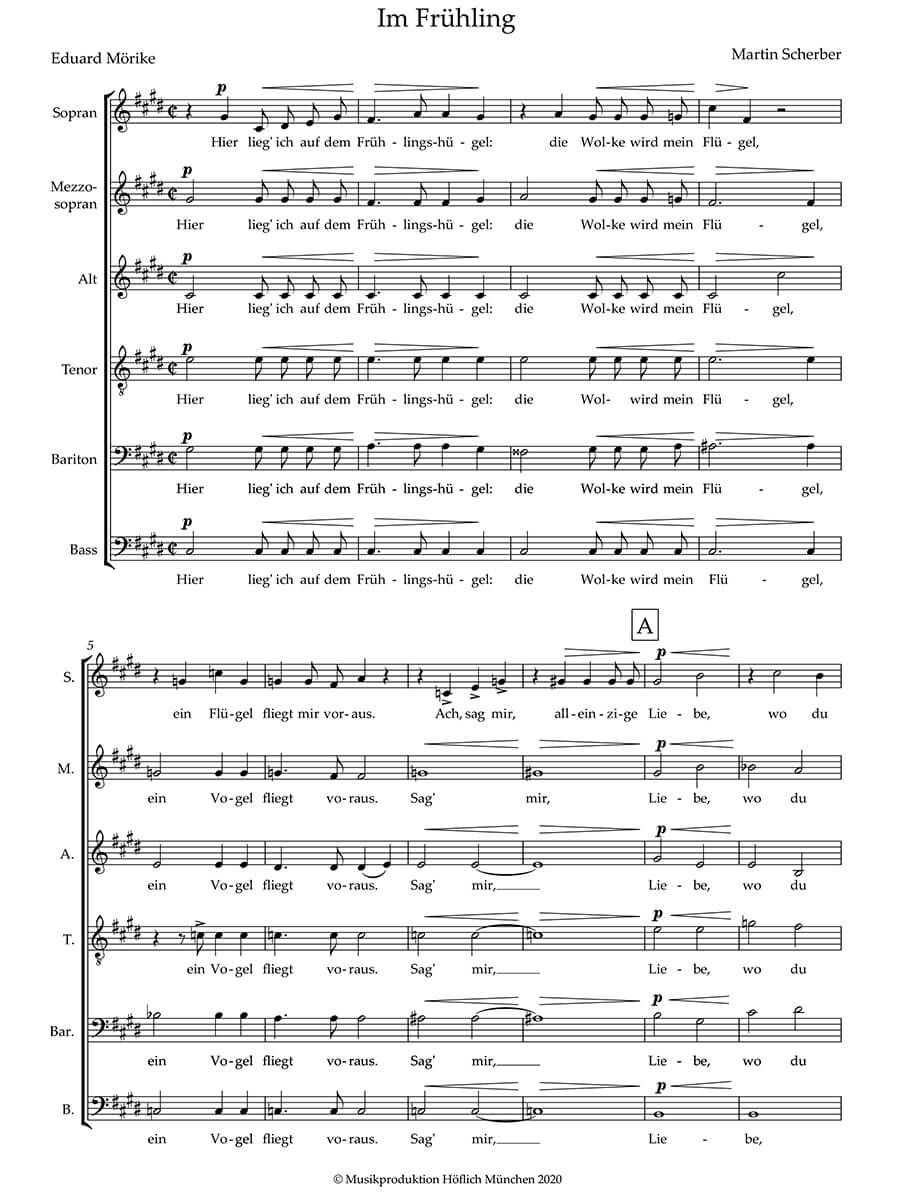Collected Songs for 4-, 5-, 6- and 8-part mixed choir a cappella (performance score/first print)
Scherber, Martin
24,00 €
Martin Scherber – Collected Songs for 4-, 5-, 6- & 8-part mixed choir a cappella
(b. 16 January 1907, Nuremberg – d. 10 January 1974, Nuremberg)
Edited and revised by Konrad von Abel
Im Frühling (In Spring) [Eduard Mörike] in 6 parts p. 1
Mausfallensprüchlein (Little Mousetrap Ode) [Eduard Mörike] in 5 parts p. 7
Mailied (May Song) in 6 parts p. 11
Nehmt bunte Bänder (Take Colorful Ribbons) in 8 parts p. 15
Es fiel ein Reif (As Hoarfrost Fell) [from ‚Des Knaben Wunderhorn‘] in 4 parts p. 21
Altdeutsches Sprüchlein (Old German Dictum) in 4 parts p. 22
Weihnachten (Christmas) in 5 parts p. 23
Maskenball (Masquerade) in 5 parts p. 31
Eija (Eya) in 5 parts p. 38
O Liebe, heil’ge Weltenmacht (O Love, Holy Universal Force) in 4 parts p. 41
Leise erbildet eine Weise sich (Silently a Tune Emerges) [Solstice] in 4 parts p. 45
Quodlibet [from: J. S. Bach’s Goldberg Variations) in 4 parts p. 48
Preface
Nuremberg composer Martin Scherber was shy of publicity. After giving up his position as Kapellmeister in Aussig, he lived a largely secluded life, devoting most of his energies to composing and teaching. As a result, not too much is known about his life, and there are few photographs of him.
Scherber was the third and youngest child of the double bass player Bernhard Scherber and began playing the violin at the age of five. Reading music was not his thing at first, but he showed early talent as a piano improviser and began composing at the age of 13. He was instructed at the piano by Karl Winkler (1899-1964) of Vienna, who was répétiteur at the Nuremberg City Theater from 1919-23, and by Maria Kahl-Decker. In 1922 he made his public debut as a pianist, and in 1923 he performed his own compositions for the first time offficially. From 1925-28 he was a student at the Münchner Akademie der Tonkunst (Munich Academy of Music, now the Academy of Music and Theater): Conducting as a major subject with Hugo Röhr (1866-1937, the former student of Franz Wüllner and Felix Draeseke) and Heinrich Knappe (1887-1980, the deserving biographer of the now forgotten, important composer Friedrich Klose), as well as piano with Franz Dorfmüller (1887-1974, co-founder of the Association for Contemporary Music) and composition with Gustav Geierhaas (1888-1967, once a student of Philipp Wolfrum and Friedrich Klose and significant especially in his string and organ music). After successfully completing his studies, Scherber went to the Sudeten German town of Aussig an der Elbe (now Ustí nad Labem on the border with Saxony in the Czech Republic) as a répétiteur, where he soon served as kapellmeister and choir director. But in 1933, after fulfilling his contract, Scherber refrained from applying for any further official position. The operetta business had completely disillusioned him, and until the end of his life he was working only as a private teacher in his hometown of Nuremberg. (After historical masters such as Conrad Paumann, Hans Leo Haßler, Johann Erasmus Kindermann, Johann Philipp Krieger, Johann Krieger, Johann Pachelbel, Johann Christoph Vogel, or Max Erdmannsdörfer, he formed, together with his contemporaries Hugo Distler [1908-42] and Franz Reizenstein [1911-68], the wondrous triad of the great Nuremberg composers of the 20th century. The highly gifted choral composer and conductor Distler died early in life by suicide, and the Jewish Hindemith pupil Reizenstein, who like Scherber remained largely unrecognized as a composer, emigrated to London in 1934, where he continued his studies with Vaughan Williams and Solomon, and in his later years achieved renown as a piano professor). …
Full preface / Komplettes Vorwort > HERE
| Score No. | |
|---|---|
| Edition | |
| Genre | |
| Size | |
| Specifics | |
| Printing | |
| Pages |
